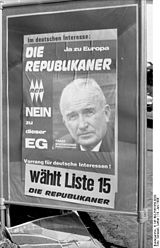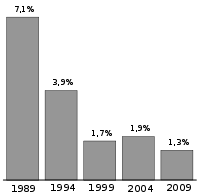- The Republicans (Germany)
-
The Republicans
Die Republikaner
Leader Rolf Schlierer Founded 26 November 1983 Headquarters Munich, Bavaria Membership 6,800 (2009)[1] Ideology National conservatism
Right-wing populism
EuroscepticismPolitical position Right-wing International affiliation None European affiliation None European Parliament Group None Official colours Black, Red, Gold Website http://www.rep.de Politics of Germany
Political parties
ElectionsThe Republicans (German: Die Republikaner, REP) is a national conservative political party in Germany. The primary plank of the program is opposition to immigration. The party tends to attract protest voters who think that the Christian Democratic Union (CDU) and the Christian Social Union of Bavaria (CSU) are not sufficiently conservative. It was founded in 1983 by former CSU members Franz Handlos and Ekkehard Voigt, and Franz Schönhuber was the party's leader from 1985 to 1994. The party has since been led by Rolf Schlierer. The Republicans had seats in the European Parliament in the 1980s, and in the parliament of the German state of Baden-Württemberg until 2001.
The German Federal Office for the Protection of the Constitution started observing the party in 1992 and categorized it as a "party with partially extreme-right tendencies," but has since 2006 stopped monitoring the party. The avowedly extreme-right party National Democratic Party of Germany (NPD) and the far-right German People's Union (DVU), both of which are more successful than the Republicans, have offered the Republicans a chance to join their electoral alliance, but the REP leaders refused any cooperation with any openly extreme-right parties. For years and especially under Schlierer's leadership, the party has lost far-right members to the DVU and NPD. The strongholds for the Republicans also differ from those of the more radical right-wing parties, with the former being strongest in the relatively affluent South Germany whilst the latter have had most success in the more economically depressed Eastern Germany.
In the 2009 federal elections, the Republicans received 0.4 percent of the total national vote. Its strongest showing was in the states of Rhineland-Palatinate and Baden-Württemberg, in which it received 1.1 percent of the vote.
Contents
Background
The CDU/CSU parties witnessed increasing dissatisfaction of their right wing in the 1980s, while at the same time the extreme-right National Democratic Party of Germany (NPD) was in decline. The CDU/CSU policies of European integration and acceptance of the Ostpolitik led to much criticism initially. Finally, in 1983, in complete breach of the party's long-term opposition to measures that could stabilize the economy of East Germany (GDR), CSU leader Franz Josef Strauss supported a credit of more than ten billion Deutsche Mark to the country. This led several members of the CSU to leave the party, including Members of Parliament Franz Handlos and Ekkehard Voigt.[2]
History
Formation and Handlos leadership
The Republicans was formed in a Bavarian tavern on 17 November 1983 by CSU defectors and MPs Franz Handlos and Ekkehard Voigt, and former radio journalist and television talk show host Franz Schönhuber, with a past in the NSDAP and Waffen-SS.[3][4][5] Handlos was chosen as the party's first leader, while Voigt and Schönhuber became his deputies. The party was initially considered both by itself and by the media as a Rechtsabspaltung (right-wing splinter) of the CSU. In its early years, the party was able to profit from dissatisfaction with the CSU due to its alleged abuse of power, patronage and limited internal democracy.[4]
Similar to what CSU-leader Strauss had long threatened the sister party CDU with, Handlos wanted to make the Republicans into a bundesweite (federal) right-wing conservative party that would contest elections in the whole of (West) Germany. Schönhuber in turn wanted a more right-wing populist party inspired by the successes of the French National Front. This led to a fierce power struggle, in which Handlos accused Schönhuber of seeking to put the party on a course towards right-wing extremism. Failing in his attempt to expell Schönhuber, Handlos instead resigned from the party, followed by Voigt a year later. Schönhuber was subsequently elected chairperson of the party in June 1985, with former NPD member Harald Neubauer as his party secretary. This strengthened media allegations that the party was right-wing extremist rather than right-wing conservative.[4][3]
Schönhuber leadership (1985–1994)
The party's first election, the 1986 Bavarian state election, gave the party financial campaign support, which it used to strenghten its organisation; by 1987 it had chapters in all but one German state.[6] In the election, it nevertheless failed to beat the 5% threshold with its 3.1% support. Outside Bavaria, the party gained less support, and ended up behind both main extreme-right parties, the NPD and the German People's Union (DVU).[7] The Republicans chose not to contest the 1987 federal election as it considered itself too weak, and CSU leader Strauss adopted some of Schönhuber's rhetoric to win back voters.[6] When prospects of German unification became more realistic, the Republicans started to see political success, and the year 1989 marked the party's electoral breakthrough. The party won 7.8% of the vote in the January 1989 election in West Berlin, giving it eleven local seats. In the European Parliament election in June later the same year, it won 7.1% of the vote and six seats. Its strongest showing was in Bavaria, where it won 14.6% of the vote.[3][7]
From the start to the end of 1989, the membership of the Republicans increased from 8,500 to 25,000. At the same time, hundreds of editorials, articles and books were written about the party, including some that speculated that it could become the fifth party of the German party system. The party gained some support among the right-wing of the CDU/CSU, and was even considered by some as a possible future coalition partner. Although some experts argued that the Republicans still was a democratic right-wing party, the majority considered that the party was part of the extreme-right.[8]
The Republicans lost its electoral gains in the 1990s as it was torn by internal strife, scandals, and failure to attract voters in former East Germany after the reunification. It contested fourteen elections between 1990 and 1991, but never surpassed the 5% threshold (although it came close in the Bavarian state election with 4.9% of the vote). Internal strife led the leadership of two state branches of the party to be collectively discharged in 1989, and in 1990, open conflict erupted between the 'moderate' Schönhuber and 'extremist' Neubauer. Schönhuber briefly resigned as party leader, until he was reinstated two months later by a majority of the party delegates. After this, the extremists, including Neubauer, were purged from the party leadership, and Neubauer was replaced by the moderate, national-conservative Rolf Schlierer.[9][3]
Although the party seemed poised to disappear in the beginning of the 1990s, it won a surprising result in the April 1992 state election in Baden-Württemberg. In the election, in which the party was headed by Schlierer, the Republicans won 10.9% of the vote and fifteen seats, and became the third largest party in the state. The party still failed to breach the 5% threshold in subsequent elections, although it won as much as 4.8% in the 1993 Hamburg state council election. Lack of further electoral successes resulted in new strife between the party's moderates and radicals, and in December 1992, the Federal Office for the Protection of the Constitution decided to start surveillance of the party. Disgruntled by the poor showings in the 1994 "super election year", Schönhuber to much surprise agreed to establish cooperations with the DVU, a party that had always been denounced as "extreme-right" by the Republicans. The Republican leadership in turn hastily convened and dismissed Schönhuber as party leader, replacing him with Schlierer.[10]
Schlierer leadership (1994–present)
The mid-1990s was marked by open conflict between the Schönhuber and Schlierer factions. While Schönhuber sought a "united right-wing" model for the party, Schlierer wanted clear distance to "extremists". Schönhuber resigned from the party alltogether in 1995, and the party subsequently contested a series of unsuccessful state elections. The litmus test for Schlierer's leadership occurred in the state election in Baden-Württemberg in March 1996, for which he had stated many times that he would resign as party leader if the party failed to get reelected to the state parliament. Schlierer eventually succeeded in his goal, against most expectations, as the Republicans won 9.1% of the vote and fourteen seats. In the following years, election results for the party again dropped, and in the 1999 European Parliament election it won just 1.7% of the vote.[11]
Ideology
When Schönhuber became the leader of the party, his positions included to abolish trade unions, reduce the welfare state, expell all foreigners and return to Germany's 1937 borders. He also campaigned for unifying Germany, which helped the party's popularity in the late 1980s. The party also attacked the European Union as an infringement on German sovereignty following the enactment of the Maastricht Treaty.[3]
International relations
The Republicans has never been particularly active in establishing relations with other parties internationally.[12] After being elected to the European Parliament in 1989, it briefly teamed up in the European Right group with the French National Front (FN) and the Belgian Vlaams Blok. Together with the Vlaams Blok, the Republicans sought to move the FN away from the Italian Social Movement, which was in conflict with the Republicans over the territorial dispute of South Tyrol.[13] The Republicans' alliance with these parties however ended already in 1990, when they accepted Neubauer and his group instead of Schönhuber in the European Right group. After the fall of Communism in Eastern Europe, the Republicans was also briefly the inspiration for some short-lived initiatives in countries including Hungary, Ukraine, Latvia and Czechoslovakia.[12]
Election results
Bundestag
Bundestag Election year # of total votes % of overall vote # of seats 1990 987,269 2.1% 0 1994 875,239 1.9% 0 1998 906,383 1.8% 0 2002 280,671 0.6% 0 2005 266,101 0.6% 0 2009 193,396 0.4% 0 European Parliament
European Parliament Election year # of total votes % of overall vote # of seats 1989 2,008,629 7.1% 6 1994 1,387,070 3.9% 0 1999 461,038 1.7% 0 2004 485,662 1.9% 0 2009 347,887 1.3% 0 Leadership
- Franz Handlos (1983–1985)
- Franz Schönhuber (1985–1994)
- Rolf Schlierer (1994–)
References
- ^ Kailitz, Steffen (1 September 2009). "Bundestagswahl 2009: REP" (in German). Federal Agency for Civic Education. http://www.bpb.de/methodik/VZGVY5,0,0,REP.html. Retrieved 30 October 2011.
- ^ Mudde, 2003, p. 31.
- ^ a b c d e Atkins, Stephen E. (2004). "Republican Party (Die Republikaner) (REP) (Germany)". Encyclopedia of modern worldwide extremists and extremist groups. Greenwood Publishing Group. pp. 273–274. ISBN 9780313324857. http://books.google.com/books?id=b8k4rEPvq_8C&lpg=PA273#v=onepage&q&f=false.
- ^ a b c Mudde, 2003, pp. 31–32.
- ^ Betz, 1990, p. 50.
- ^ a b Betz, 1990, p. 51.
- ^ a b Mudde, 2003, pp. 32–33.
- ^ Mudde, 2003, pp. 33–34.
- ^ Mudde, 2003, p. 34.
- ^ Mudde, 2003, pp. 35–36.
- ^ Mudde, 2003, pp. 36–37.
- ^ a b Mudde, 2003, p. 38.
- ^ Mudde, 2003, p. 33.
Bibliography
- Betz, Hans-Georg (October, 1990). "Politics of Resentment: Right-Wing Radicalism in West Germany". Comparative Politics 23 (1): 45–60. http://links.jstor.org/sici?sici=0010-4159%28199010%2923%3A1%3C45%3APORRRI%3E2.0.CO%3B2-X.
- Mudde, Cas (2003). "Die Republikaner". The ideology of the extreme right. Manchester: Manchester University Press. pp. 31–59. ISBN 9780719064463. http://books.google.com/books?id=spT-NgRm3f8C&lpg=PP1&pg=PA31#v=onepage&q&f=false.
External links
Categories:- Political parties established in 1983
- Conservative parties in Germany
- Right-wing populism
Wikimedia Foundation. 2010.


